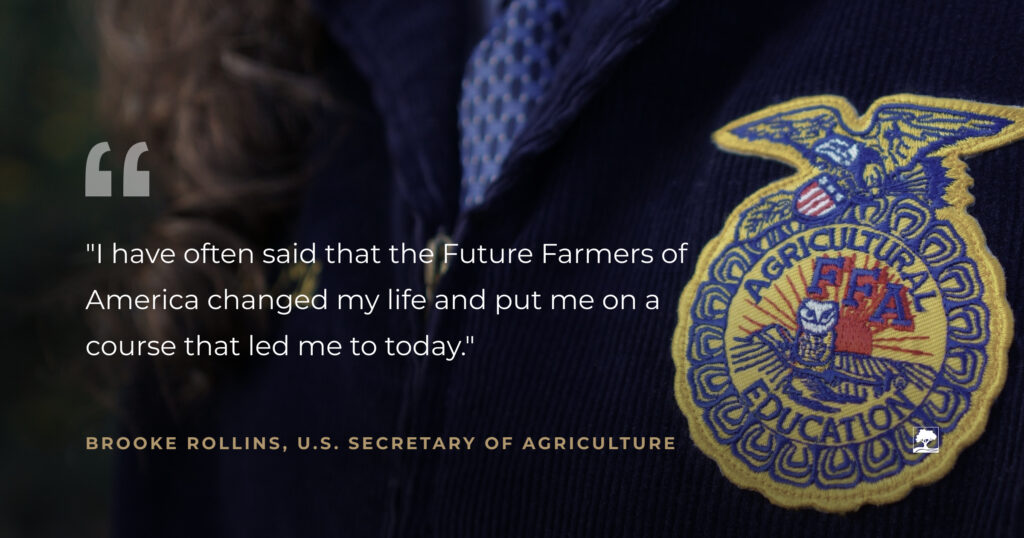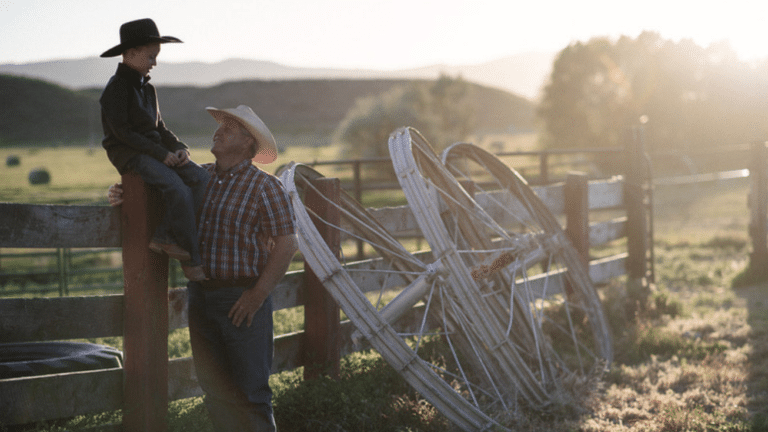Celebrating National FFA Week and the Importance of Agricultural Education
National FFA Week celebrates the critical role this organization plays in agricultural education and leadership development.
Agricultural education is important for a number of reasons—a primary one being to cultivate the next wave of young leaders who will keep our nation fed. A study conducted by AgAmerica in 2015, found that when asked about the transitioning process of a farming operation, 64 percent of respondents said their biggest concern was setting the next generation up for success.
In addition, 34 percent of respondents were primarily concerned about whether or not the next generation will want to fill their shoes. The average age of primary operators in 2017 (59.4) has increased nearly a decade from the average age in 1982 (50.5). As more primary farm operators near the age of retirement, sparking agricultural interest in younger generations is imperative to its survival. Organizations like Future Farmers of America (FFA) do exactly that, by providing agricultural education programs, grants, and experiences to empower young people in their future career endeavors.
The Rise of Agricultural Education and the FFA Organization
In 1900, nearly half of American families resided on agricultural land. As urbanization emerged, President Woodrow Wilson recognized the need to continue agricultural education for the generations to come. In 1917, he signed the Smith-Hughes Act, which provided funding for agricultural education, home economics, and trade classes in public schools. Eight years later, three educators at Virginia Tech founded the organization Future Farmers of Virginia. It didn’t take long for chapters to begin emerging across the country. In 1928, FFA held the first annual convention in Kansas City, Missouri, with 33 delegates representing 18 states. By the second convention, FFA had 1,500 chapters with over 30,000 total members. It was during this time that the organization adopted national blue and corn gold as their official colors as a symbol of unity. The national blue represents the American flag and the corn gold represents a crop grown all over the country. The FFA signature blue corduroy jacket was introduced in 1933 to remind members of their part in something bigger than themselves.

Over the years, the FFA has expanded its chapters to every state in the U.S. The organization expanded internationally in 1949 with the Young Farmers Club of Great Britain. Since then, chapters have emerged in the U.S. Virgin Islands, Guam, and Micronesia. In 2024, the organization hit an agricultural education milestone, reaching a record-breaking one million FFA members.
“It’s exciting to watch this generation continue to find their place in agricultural education and FFA. We know there are many opportunities in the field of agriculture – from being a leader in your community to filling the need in the talent pipeline in one of the more than 350 careers in agriculture. We believe our members are also seeing these opportunities and welcome all to the table.”
– Scott Stump, National FFA CEO
FFA Mission and Core Values that Promote Agricultural Education
Learning to Do, Doing to Learn, Earning to Live, Living to Serve.
FFA Creed
Throughout the evolution of its existence, FFA remains committed to these key values, teaching its members about this humble way of life.
Career Development for Youth in Ag
Through FFA, members have access to networking opportunities that expand beyond agricultural education. FFA alumni often pursue careers as chemists, veterinarians, government officials, entrepreneurs, bankers, teachers, and more. The FFA experience helps students prepare for a variety of career paths with agriculture at the forefront. AgExplorer was created in 2016, a career website to help students explore unique careers in agriculture.
Personal Growth Through Outreach Programs
FFA has offered members unparalleled agricultural education experiences over the years through initiatives like the Global Outreach Program, with a focus on not just professional development but personal growth as well. Through classroom and supervised agricultural experiences (SAEs), students are encouraged to expand their comfort zones and develop strong moral character.
Community Involvement Opportunities
Engagement programs connect local chapters with businesses in their area. Some of these businesses include automotive and tractor dealers, agricultural retailers, seed growers, restaurants, and manufacturers. FFA members are encouraged to give back to their local community through a number of advocacy projects.
Leadership Training for Future Ag Leaders
FFA teaches members valuable leadership skills, such as public speaking, writing, organization, networking, and advocacy. The organization prides itself on creating leaders who lead regardless of their title.
Agricultural Education
FFA divides school-based agricultural education into three components: classrooms and laboratories, SAEs, and the programs and resources available within the organization. The National Council for Agricultural Education was created in 1983 to help FFA achieve its goal of empowering the agriculture industry with future leaders.
Collaboration and Diversity Across the Ag Community
Since its inception in 1925, FFA has promoted healthy collaboration and encouraged diversity. The H.O. Sargent Award was created to inspire member diversity and success in honor of H.O. Sargent, an agricultural education federal agent for African-Americans at the U.S. Office of Education and a co-writer of FFA’s first bylaws. The year 2009, marked 40 years of female involvement with the organization. Beyond gender and race, FFA encourages members from different agricultural backgrounds, such as urban and conventional farming, to work together towards innovative solutions for the agricultural issues of today.
Building a Stronger Foundation for Future Farmers and Agricultural Workforce
Agricultural Educational Programs
FFA offers young people the unique ability to experience common challenges farmers and ranchers face in a positive, supportive, and educational environment. This is done through youth livestock shows, state fairs, and agriculture festivals like the Florida Strawberry Festival. Food for America is an educational program that focuses on agricultural literacy and involves FFA members in leadership skill development, reaching out to upper-elementary students and educating them on the world of agriculture. The Partners in Active Learning Support Program (PALS) is an initiative that teaches both mentors and mentees an understanding and appreciation for diverse learning styles.
Scholarships and Grants
More than $2 million of the FFA Foundation fund is allocated to scholarships for higher education each year. The organization offers grant opportunities for middle school and high school students to complete SAEs and fund membership fees through programs like Grants for Growing (G4G) and Living to Serve grants.
Volunteer Opportunities
The Living to Serve program motivates students to positively impact their community through service project opportunities and friendly competitions. The Living to Serve Chapter Challenge is currently underway and encourages FFA members to collectively complete 930,000 volunteer hours by the 93rd National FFA Convention and Expo. The organization also offers a guide to finding eligible volunteer opportunities in each chapter’s local area.
How AgAmerica Supports Agricultural Education
AgAmerica supports FFA and all that this historical organization stands for. We’ve had the honor of sponsoring countless FFA projects and events, such as the Florida FFA’s 91st Convention and Expo video, to help showcase FFA members’ hard work and achievements.
We’ve also had the privilege of capturing stories of young farmers across the nation, including FFA member Jaxyn Wheatley—an inspiring sixth-generation Idaho rancher with an impressive work ethic.
Jaxyn’s dedication to her family’s ranch and enthusiasm for agriculture represents the same hope our team at AgAmerica shares for future farmers. We are grateful for having had the opportunity to sponsor her steer during livestock competitions and share stories like hers with the larger community.







